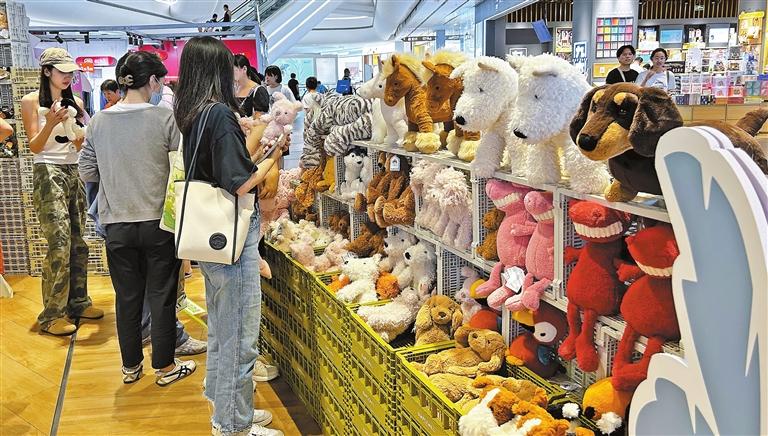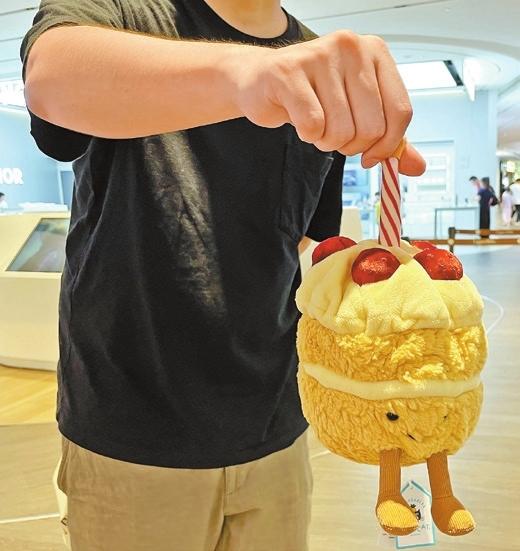

Yu Yuanfan aimee3031@126.com IT can be a bunny, a bear or a penguin. It can also be creatures less seen in stuffed toy designs, such as a chameleon, a lizard, a scallop, a lobster or even a frog. It also comes in shapes of food and everyday items around us, from avocados, tomatoes and croissants to potted flowers, coffee cups and soccer balls. It is Jellycat, probably one of the most popular stuffed toy brands in China in recent years. The U.K. brand’s popularity is reflected in figures: Its two official Taobao shops have 1.68 million and 1.18 million followers, respectively, with its bestselling Peanut Penguin plushie sold over 4,000 pieces over the past month. On Chinese lifestyle sharing social media platform Xiaohongshu, Jellycat has some 220,000 followers, more than double its 104,000-follower fanbase on Instagram. So, what makes Jellycat stuffed toys so appealing, or to be more specific, why do they seem to appeal to young people more than to kids? Shenzhen Daily has talked to some Jellycat fans in the city to figure out the reasons behind this trend. They’re cute and unique “Cute,” “lovely” and “creative” were the words almost all interviewees answered when asked why Jellycat toys are worth buying. Sansan, owner of four Jellycat products, told the reporter that she first learned about the brand when she saw someone walking with a Jellycat shoulder bag. “It was [in the shape of] an avocado,” she recalled. “I thought it was very lovely because I never saw a bag in such a design, and it had two little feet swinging as its owner walked. So, I went home and did some research and got myself one, too.” According to the 28-year-old, she likes Jellycat because it has many designs that people will not find in other similar brands. “They don’t just have [stuffed toys in the shapes of] animals. They also have plants, food and many more, and many of them come with two lovely little feet, which make them somewhat look like humans and that’s even more adorable.” Xiaoluo, 24, who just bought his second Jellycat collection in a pop-up plushie shop in Futian District before Shenzhen Daily interviewed him, described many of the brand’s designs as “unexpected.” “For example, lobster, eggplant and this birthday cake I’ve just bought,” he said as he showed the reporter his latest shopping haul. “These are all what we normally won’t associate with plush toys. Although some of them look quirky at first sight, the more I see them, the more I can get their loveliness. I think the company is amazing in terms of turning these unexpected things into plushies, and in a cute way.” They’re soothing Jellycat has been manufacturing stuffed toys since 1999. The company’s very first product, as the reporter was told by staffers at a Jellycat franchise store in Nanshan District, was a range of bunny toys intended as kids’ soothing toys. Two decades later, these soothing toys are seeing a new fan base: stressed out young people. For 27-year-old Daisy, her moment is lying on the couch with her Jellycat daisy in her arms after going home from work. “I spend two hours commuting every day, and working overtime has been the norm for me, so I often go home feeling tired and just don’t want to talk or move too much,” she shared with Shenzhen Daily. “Whenever I go home, my daisy is always there waiting for me with a smile on her face. I sometimes talk to her about my happiness and frustrations, and it doesn’t matter that she can’t reply, because I’ve had enough opinions and suggestions from people around me. She feels so soft — when I hug her, I feel like she is also hugging me.” Another interviewee, Jiajia, has more than a dozen Jellycat plushies in her home, with some for her and some for her 2-year-old daughter. The mother told Shenzhen Daily that the first Jellycat toy in her home was actually a gift to her daughter from her friend, and her first impression was its soft texture. “I know it’s for kids, but it’s just so soft and so comfortable, different from any dolls or stuffed animals I ever bought. Lovely things and soft things both make people feel happy and less stressful, and Jellycat toys have both characteristics. That’s probably why young people like them so much,” she said. They’re me Daisy, whose job involves some marketing tasks, also shared her insights on Jellycat’s success in China from a marketing perspective. “The Jellycat toys, with their cute looks, are a huge inspiration for user-generated content (UGC) on social media platforms. Today’s young people don’t shy from telling others who they are. By sharing on platforms such as Xiaohongshu about the Jellycat pieces they own, the accessories they put on the plushies to give them characteristics, and the memes they photoshop using photos of their plushies, they’re actually sharing about their tastes, personalities and lifestyles. A wide extent to which these contents reach the platforms’ users in turn helps the brand build its brand popularity,” she said. | 
